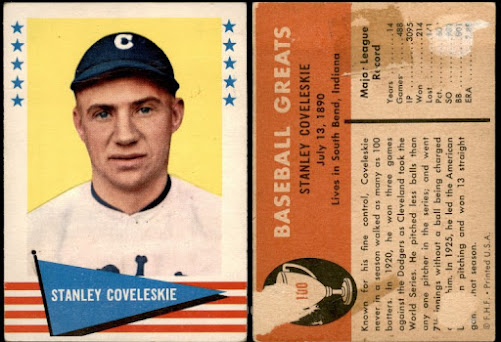"There was nothing strange in those days about a twelve-year-old Polish kid working in the mines for 72 hours a week at a nickel an hour", he later recalled. "What was strange is that I ever got out of there". Stanley Coveleski left the Shamokin coal mines to play baseball, and was elected into the Baseball Hall Of Fame, February 2nd, 1969.
- Inducted into the Baseball Hall of Fame in 1969
- The National Polish-American Sports Hall of Fame 1976
- The Minor League baseball stadium in South Bend Indiana, where he retired after playing ball, is named in his honor.
- Interviews with Coveleski were used in the 1966 book "The Glory Of Their Times" by Lawrence Ritter
Stanislaus Anthony Kowalewski was born in Shamokin, Pennsylvania, one of eight children of Anthony and Ann (Racicz) Kowalewski, who had immigrated from Russian Poland in the early 1870s. They settled in Shamokin, where Anthony worked as a coal miner
Stanley was the youngest of five baseball-playing brothers; his oldest brother Jacob died serving in the Spanish–American War (1898). In addition to his older brother Harry, who pitched in the major leagues between 1907 and 1918, their other brothers Frank and John also played professional baseball, but only in the minor leagues. Harry won 20 games in a season on three occasions during his 14-year major league career.
Like many his age in the Shamokin area, Coveleski began work as a "breaker boy" at a local colliery at the age of 12. In return for 72 hours of labor per week, Coveleski received $3.75, or about five cents an hour. "There was nothing strange in those days about a twelve-year-old Polish kid working in the mines for 72 hours a week at a nickel an hour", he later recalled. "What was strange is that I ever got out of there". Coveleski was rarely able to play baseball as a child due to his work schedule.
Nevertheless, he worked on his pitching skills during the evenings, when he threw stones at a tin can placed 50 feet away. When he was 18 years old, Coveleski's abilities caught the attention of the local semi-professional ball club, which invited him to pitch for them.
"When it came to throwing a baseball, why it was easy to pitch", Coveleski recalled. "After all, the plate's a lot bigger than a tin can to throw at". His baseball career in Shamokin was short-lived; after five games, Coveleski relocated to Lancaster, Pennsylvania
Coveleski was an American right-handed pitcher in Major League Baseball who played for four American League (AL) teams between 1912 and 1928, primarily the Cleveland Indians.
The star of the Indians pitching staff, he won over 20 games each year from the epidemic-shortened 1918 season through 1921, leading the AL in shutouts twice and in strikeouts and earned run average (ERA) once each during his nine years with the club.
Orlando Sentinel, Feb 1969
Coveleski was among 17 spit ball pitchers permitted to continue using the wet delivery after it was banned in 1920.
The star of the 1920 World Series, he led the Indians to their first title with three complete-game victories, including a 3–0 shutout in the Game 7 finale. Traded to the Washington Senators after the 1924 season, he helped that club to its second AL pennant in a row with 20 victories against only 5 losses, including a 13-game winning streak, while again leading the league in ERA.
He was elected into the Baseball Hall Of Fame, February 2nd, 1969.
"I should have been in that quite a long time ago. I figured I'd get in sooner or later and just kept hoping each year would be the one"
May 21 1914 - Coveleskie Day at Shibe Park
===============
===============
READ MORE
============
Find his stats here:















Heather, Another great story. I admire your work and the research to supplement your stories.
ReplyDelete